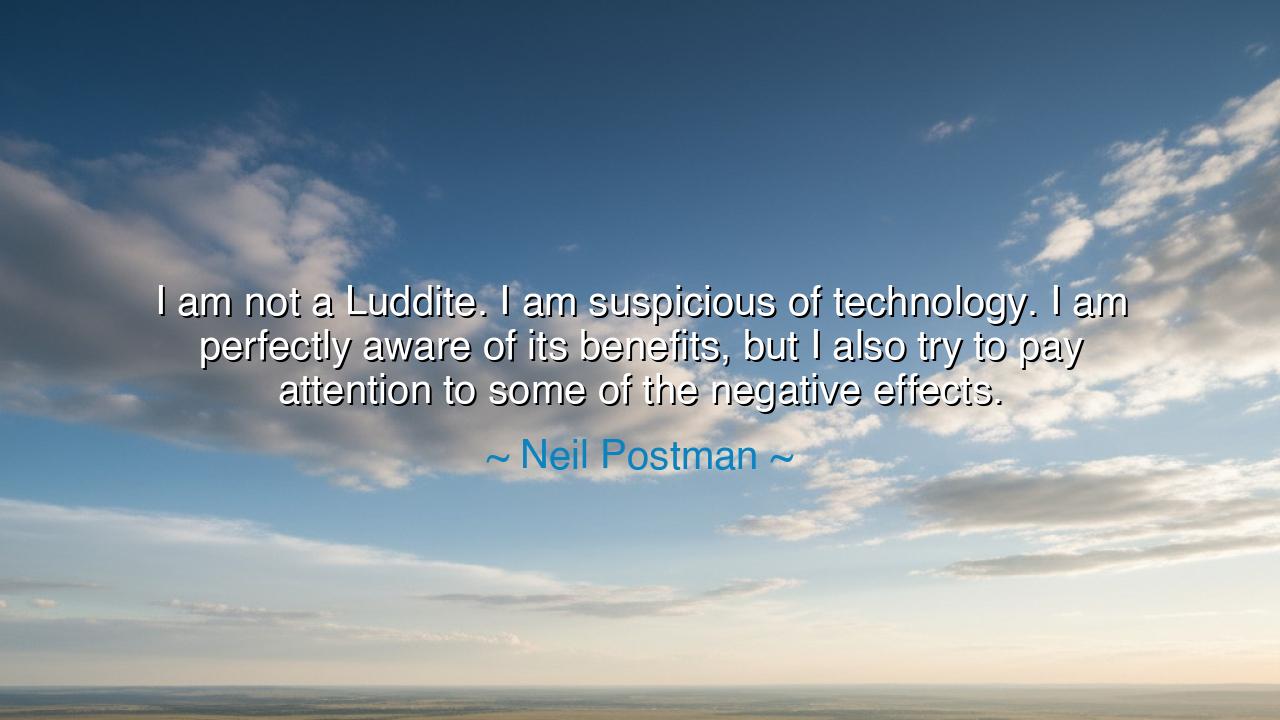
I am not a Luddite. I am suspicious of technology. I am
I am not a Luddite. I am suspicious of technology. I am perfectly aware of its benefits, but I also try to pay attention to some of the negative effects.






Hear the discerning voice of Neil Postman, the thinker who peered not only at the gleaming face of progress but also at its shadows. He declared: “I am not a Luddite. I am suspicious of technology. I am perfectly aware of its benefits, but I also try to pay attention to some of the negative effects.” These words are neither the cry of a fearful man nor the chant of one who rejects invention. Rather, they are the wise counsel of one who sees both the light and the darkness in the tools humanity creates.
From the beginning of time, man has fashioned tools to ease his burdens. Fire gave warmth, the plow gave bread, the wheel gave movement. Each new invention carried blessings, yet also dangers. Fire can cook or destroy; the wheel can move armies to trade or to war. Thus, Postman’s wisdom lies in reminding us that technology is never neutral. To embrace it blindly is to risk slavery; to fear it blindly is to reject progress. The balance lies in vigilance, in questioning, in asking always what price is being paid for each new gift.
The word Luddite recalls the English workers of the 19th century who smashed machines that threatened their livelihoods. They saw only destruction in the new looms, and their rebellion was fueled by despair. Postman distinguishes himself from them: he does not reject the loom itself, nor the tool in principle, but he insists on watching carefully what it does to human hearts, to culture, to thought. He is not the destroyer of machines but the examiner of their power.
Consider the story of the television. When it first entered homes, it was hailed as a marvel that would bring knowledge, connection, and enlightenment to every household. And indeed, it carried wonders: art, education, and shared experience. Yet with time, it also brought passivity, distraction, and the drowning of reason beneath the flood of entertainment. What began as a window to the world became, in many homes, a prison of noise. This is what Postman warns of: that every gift of technology carries within it a burden unseen.
His words do not tell us to abandon benefits, but to measure them against their costs. The smartphone, for instance, grants knowledge at a touch, yet it may steal our attention, our stillness, our ability to be fully present. Social media connects millions, yet it also breeds envy, division, and addiction. To be “suspicious,” as Postman says, is to keep watch as a sentinel at the gate—to receive the tool but to guard against its power to rule the soul.
The meaning for us is plain: we must be masters of our tools, not slaves to them. To accept technology without question is to walk blindly into chains. To reject it outright is to cut ourselves off from progress. The path of wisdom is in discernment—welcoming the good, resisting the harmful, shaping technology to serve life, not allowing life to serve technology.
Take action, beloved listener. When a new tool enters your life, pause and ask: Does this make me freer, or more bound? Does it enrich my relationships, or diminish them? Does it sharpen my mind, or dull it? Learn to use technology with discipline, to set boundaries where it seeks to consume, and to keep your spirit sovereign. For only then can its blessings shine without its curses overwhelming.
Thus, the teaching of Neil Postman endures like a warning etched in stone: “Be aware of the benefits, but do not ignore the negative effects.” For the sword of technology is double-edged, and only the wise may wield it without being cut. Let us therefore walk as guardians of our own destiny, suspicious enough to be safe, yet open enough to grow, so that progress may serve humanity, and not humanity progress.






AAdministratorAdministrator
Welcome, honored guests. Please leave a comment, we will respond soon